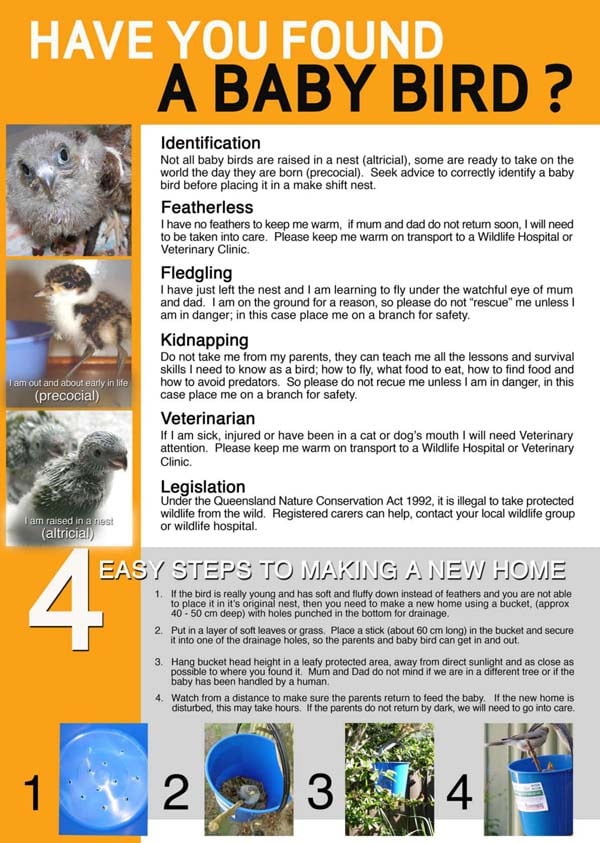What should I do?
Finding a Baby Bird
What should I do if I find a baby bird?
Most baby birds emerge from their nests during spring and summer as they learn how to fly. As they start to venture from their nest, often they can be found on the ground where well-meaning passers-by may find them and may become concerned as in the early stages of ‘flying school’ they are still unable to fly. Usually their parents are nearby, and not every case needs to be ‘rescued’ and taken to a vet.
Below are some questions to ask BEFORE you move the baby bird:
- Is the chick injured, or has it been in contact with a cat or dog?
- Does the chick have feathers?
- Can you find its nest and put it back safely?
- Is the chick in a safe place, away from traffic, people and pets?
In any situation where injuries are evident, or you have seen a cat or a dog with the chick, it will need to be assessed by a vet and ongoing care provided. The chick can be placed in a warm secure environment, such as a lined cardboard shoe-box with holes in the top for safe transport. When you bring the chick to the vet, we will take some details to ensure the bird can be re-released in the same place when it has recovered.
If the chick has not been injured, then it is best to intervene as little as possible. If the nestling DOES NOT have feathers, then it can be placed back in its nest if you can find it, or a substitute nest made with a plastic container with soft bedding and placed in a safe place. Ensure that some drainage holes are placed in the bottom to prevent drowning if it rains. If the chick DOES have feathers, make sure it is in a safe spot – you don’t need to make a substitute nest for it. Keep an eye on the chick over the next few hours, if the parents are tending to it then no further intervention is needed.
In summary, a baby bird needs rescuing in the following situations:
- The chick has been brought in by a pet dog or cat
- Wounds are visible
- The chick is cold and not responsive to touch
- The chick in a dangerous location such as in a drain or next to a road
- If it is covered in ants
- If no parents return to feed it within four hours

24 Hour Services
Sydney Wildlife Rescue and WIRES both provide a 24/7 help-line where you can obtain advice if you find a baby bird and are unsure of what to do. In some cases, they can organise a carer to come and collect the bird from you.
Sydney Wildlife Rescue – (02) 9413 4300 www.sydneywildlife.org.au
WIRES – 13 000 WIRES (1300 094 737) www.wires.org.au


